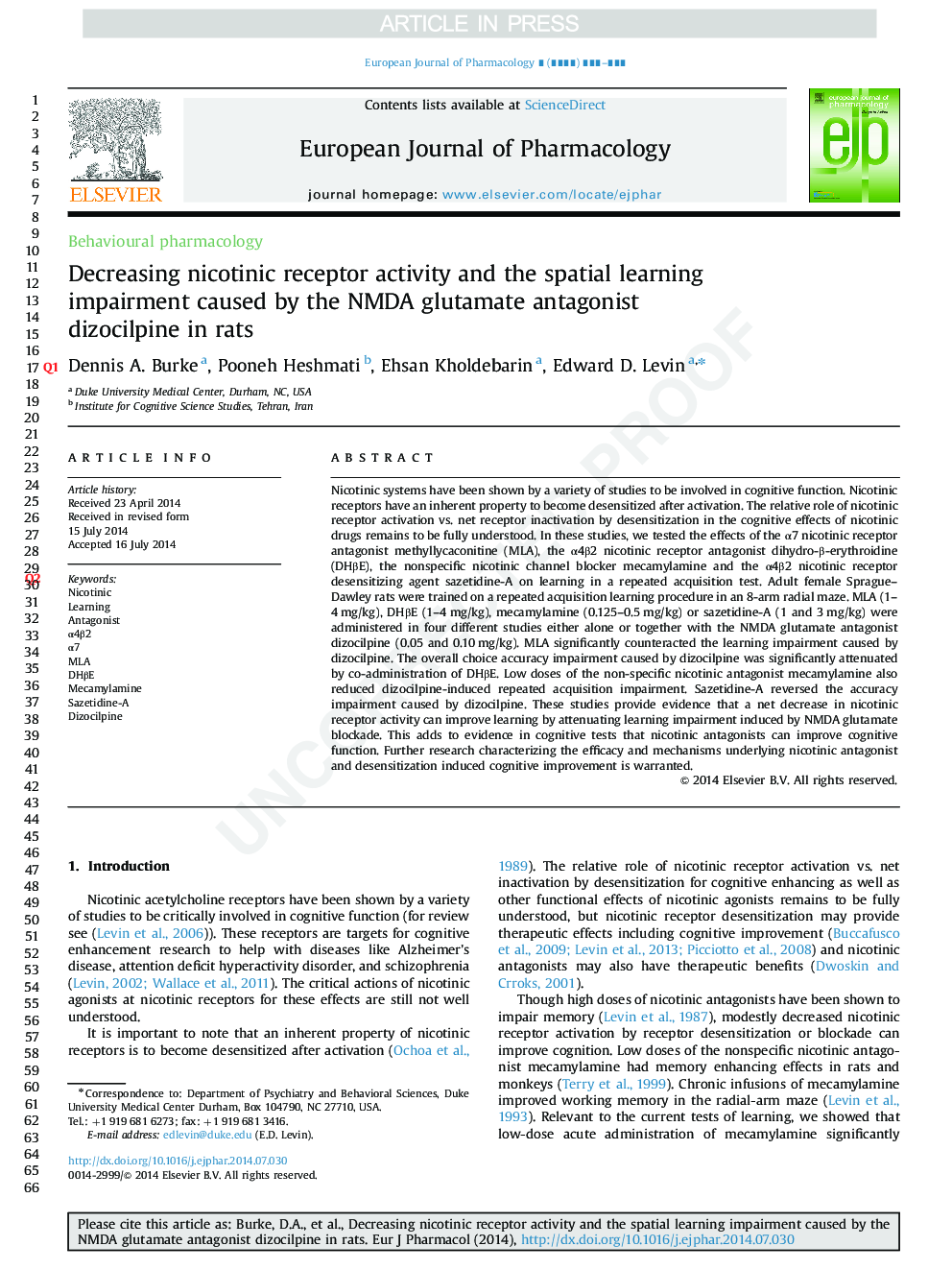| کد مقاله | کد نشریه | سال انتشار | مقاله انگلیسی | نسخه تمام متن |
|---|---|---|---|---|
| 5827634 | 1558940 | 2014 | 8 صفحه PDF | دانلود رایگان |
عنوان انگلیسی مقاله ISI
Decreasing nicotinic receptor activity and the spatial learning impairment caused by the NMDA glutamate antagonist dizocilpine in rats
دانلود مقاله + سفارش ترجمه
دانلود مقاله ISI انگلیسی
رایگان برای ایرانیان
کلمات کلیدی
موضوعات مرتبط
علوم زیستی و بیوفناوری
علم عصب شناسی
علوم اعصاب سلولی و مولکولی
پیش نمایش صفحه اول مقاله

چکیده انگلیسی
Nicotinic systems have been shown by a variety of studies to be involved in cognitive function. Nicotinic receptors have an inherent property to become desensitized after activation. The relative role of nicotinic receptor activation vs. net receptor inactivation by desensitization in the cognitive effects of nicotinic drugs remains to be fully understood. In these studies, we tested the effects of the α7 nicotinic receptor antagonist methyllycaconitine (MLA), the α4β2 nicotinic receptor antagonist dihydro-β-erythroidine (DHβE), the nonspecific nicotinic channel blocker mecamylamine and the α4β2 nicotinic receptor desensitizing agent sazetidine-A on learning in a repeated acquisition test. Adult female Sprague-Dawley rats were trained on a repeated acquisition learning procedure in an 8-arm radial maze. MLA (1-4 mg/kg), DHβE (1-4 mg/kg), mecamylamine (0.125-0.5 mg/kg) or sazetidine-A (1 and 3 mg/kg) were administered in four different studies either alone or together with the NMDA glutamate antagonist dizocilpine (0.05 and 0.10 mg/kg). MLA significantly counteracted the learning impairment caused by dizocilpine. The overall choice accuracy impairment caused by dizocilpine was significantly attenuated by co-administration of DHβE. Low doses of the non-specific nicotinic antagonist mecamylamine also reduced dizocilpine-induced repeated acquisition impairment. Sazetidine-A reversed the accuracy impairment caused by dizocilpine. These studies provide evidence that a net decrease in nicotinic receptor activity can improve learning by attenuating learning impairment induced by NMDA glutamate blockade. This adds to evidence in cognitive tests that nicotinic antagonists can improve cognitive function. Further research characterizing the efficacy and mechanisms underlying nicotinic antagonist and desensitization induced cognitive improvement is warranted.
ناشر
Database: Elsevier - ScienceDirect (ساینس دایرکت)
Journal: European Journal of Pharmacology - Volume 741, 15 October 2014, Pages 132-139
Journal: European Journal of Pharmacology - Volume 741, 15 October 2014, Pages 132-139
نویسندگان
Dennis A. Burke, Pooneh Heshmati, Ehsan Kholdebarin, Edward D. Levin,